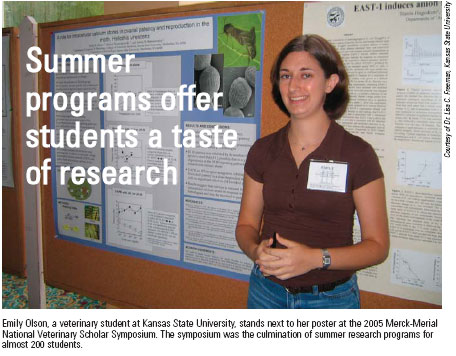Summer programs offer students a taste of research
|
Introducing veterinary students to research is the goal of summer programs at colleges across the country. A July symposium showcased this year's success stories, while deadlines already are approaching for next year's research programs. The 2005 Merck-Merial National Veterinary Scholar Symposium was expanded—with funding from the AVMA, National Institutes of Health, and Association of American Veterinary Medical Colleges—to encompass summer research programs at all veterinary colleges. More than 200 students, speakers, and scholars attended the four-day event at the University of Georgia to share research on the topic of "Veterinary medicine and biomedical science: Intersection on the road ahead." "It's really pretty astonishing what students are able to accomplish in 12 or fewer weeks during the summer," said Dr. Christopher S. King, the university's assistant vice president for research and director of the Animal Care and Use Program. Dr. King said the Georgia Veterinary Scholar Program, which he co-directs, is a crash course in biomedical research. Students learn about ethics, curricula vitae, library research, abstracts, research papers, bench work, oral presentations, and finally, posters. Subjects of research range from traditional models of infectious disease to molecular medicine to environmental enrichment for laboratory animals. Dr. King said the summer programs help students decide whether they want to pursue careers in research. He added, "We aren't training enough veterinary scientists to sustain our profession in the future." "Critical needs for research in veterinary science," a July report from the National Academies, also concludes that veterinary colleges need to develop student interest in veterinary research. The report recommends, among other measures, strengthening summer programs as one way to expose students to basic science and hands-on research. Dr. John C. Baker, associate dean for research and graduate studies at Michigan State University's College of Veterinary Medicine, agreed that part of the problem is a lack of opportunities for veterinary students to explore research as a career path. Also, he said, most students who go into veterinary medicine plan on careers in clinical practice rather than research. Additionally, high educational debt discourages students from pursuing research training. Dr. Baker, who also serves on the AVMA Council on Research, emphasized the importance of expanding summer research programs, which expose students to research early in their education. Dr. Lisa C. Freeman, associate dean for research and graduate programs at Kansas State University's College of Veterinary Medicine, said early analysis indicates that more students go into research if they participate in a summer program. Even participants who go into private practice tell her that the program played a big role in their education. "They have a very different vision of veterinary medicine," she said. "I think everyone is positively impacted by the program." Dr. Freeman said the Veterinary Research Scholars Program at Kansas State started within the veterinary college, but it now extends into three colleges and six departments. Research spans the spectrum from genomics to public health to comparative medicine. The symposium at the end of the summer allows students from many veterinary schools and colleges to compare notes. This year, the symposium also featured the Young Investigator Award Competition. Dr. Freeman said the competition provided examples of graduate veterinarians who are pursuing research training in doctoral or postdoctoral programs. The winner was Dr. Tracey L. Pappenfuss of The Ohio State University for her project "Pregnancy hormones produce regulatory dendritic cells that influence the autoimmune disease experimental autoimmune encephalomyelitis." The 2006 symposium is still in the planning stage, as are some summer programs, though organizers want to continue the conversation among colleges and sponsors about student research. "Our hope is that next summer's symposium will be as broad," Dr. Freeman said. | ||
